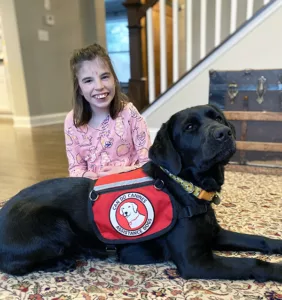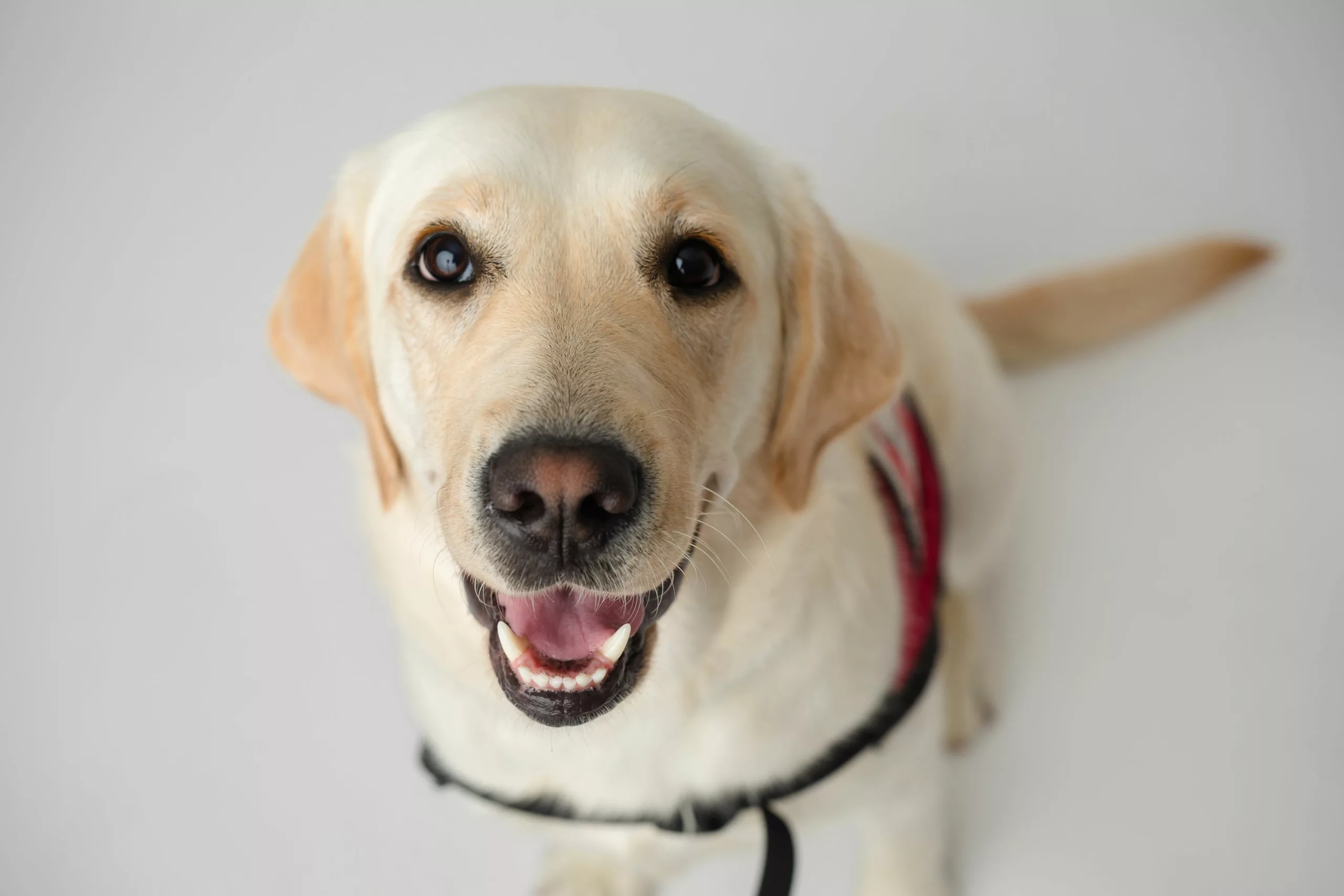Eleven-year-old Ellie loves stuffed animals. She has a sloth named Sunny, a penguin named Pip, a dog named Bluey, a shark named William, and many more. She says, “My stuffed animals make me feel happy.” Now Ellie has a new animal in her life: a black Lab Autism Assist Dog named Bonnie.
Born with Cri du chat syndrome, a rare genetic disorder similar to autism, Ellie was not expected to walk, talk, or eat on her own. Her mom, Kari, says, “It was a pretty grim diagnosis, but, since day one, we've really done everything in our power just to ensure we give Ellie all of the opportunities for her to live the fullest life possible.” With several types of therapies over the years, Ellie has done well. Then, a few years ago, Kari and husband Justin considered an additional “opportunity” of an assistance dog for Ellie and applied with Can Do Canines.
 In late 2022, the family was thrilled to learn that Bonnie would be joining their household. Kari remembers when Bonnie first came to their home to meet Ellie, and Ellie flung open the door to squeal, “Yay, Bonnie!” Kari explains, “[Ellie’s] always loved dogs. She can name every single dog in our neighborhood. If we met a dog on a walk five years ago, she can still remember the dog's name. It’s incredible, right? She just really has this passion and love for animals.”
In late 2022, the family was thrilled to learn that Bonnie would be joining their household. Kari remembers when Bonnie first came to their home to meet Ellie, and Ellie flung open the door to squeal, “Yay, Bonnie!” Kari explains, “[Ellie’s] always loved dogs. She can name every single dog in our neighborhood. If we met a dog on a walk five years ago, she can still remember the dog's name. It’s incredible, right? She just really has this passion and love for animals.”
Bonnie is equally passionate about Ellie and loves to help her stay calm. Justin says that Ellie “has a lot of anxiety … and is also a runner.” Justin shares, “Anytime we were out in public, staying with us was always a challenge. She’ll see something and she goes. It was really hard for us to be out as a family. We would literally have to have one arm on Ellie and one arm trying to do whatever we were doing.” Now, tethered to Bonnie, Ellie is able to not only stay safe but also feel more confident leaving the house. Previously, she expressed a lot of nervousness when having to attempt new environments.
Justin also mentions the overall positive effect Bonnie has had on their family outings. “It is a night-and-day difference going out to dinner.” Ellie doesn’t get out of her seat so much or get hyperfocused on her phone or something else. “Now she’s engaging more,” says Justin.
But Bonnie doesn’t have to be out among crowds to make difference. Kari and Justin report that Ellie is sleeping much better now with Bonnie and no longer regularly gets out of bed. She also tends to pick the skin on her hands and face quite often and easily gets fidgety. Bonnie provides an alternate, healthy focus. Justin says, “Ellie gets in a loop. She sometimes will get so focused on something … almost obsessive, and Bonnie is there to help alleviate that and get her off that track. It's an easy thing for Ellie to do, to go snuggle Bonnie, and then she quickly breaks out of that loop, which has been awesome.”
For all these reasons and more, Kari and Justin offer a “giant thank you” to Can Do Canines supporters. “They’re investing their time and their resources for someone they’ve never met,” says Justin. “The impact that it has had on our life in such a short timeframe is really hard to even put it into words. We think Bonnie is the perfect addition to our family, and to think about the amount of time and effort it took to get Bonnie to where she’s at, where she can help Ellie and her quality of life, I mean, it’s priceless for us.”
Ellie, herself, is delighted with her new furry friend. Kari states, “Bonnie continues to be a main theme through all the notes from school. The entire school staff knows about Bonnie. Ellie loves talking and sharing about Bonnie.” In fact, when asked why she likes Bonnie, Ellie responds, “Bonnie makes me feel happy.”
What more can a girl ask for?
Thank you to all those who made this partnership possible:
Great Start Home — Mary Spencer
Puppy Raiser — Stanley Correctional Institution
Special Thanks — Brian Etling, Jim Peterson, University of Minnesota FETCH Program
Name-A-Puppy Donor — Mike Reber

 Dogs’ Musical Preferences
Dogs’ Musical Preferences




